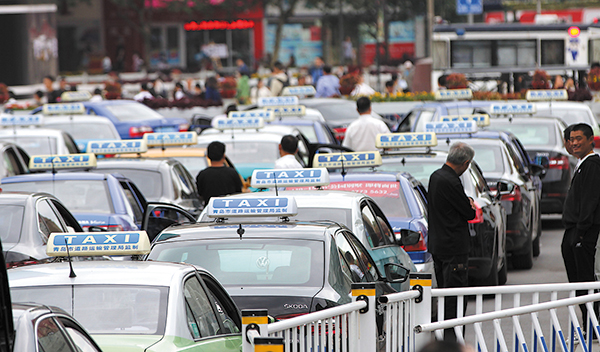 |
|
Taxies wait for passengers at the Qingdao railway station on Oct 7. [Photo by Huang Jiexian/For China Daily] |
Online chauffeured car hailing platforms' development may slow down in the tough days ahead, as major Chinese cities squeeze out the popular compact vehicles from business.
Mid-size or bigger car models are required for the burgeoning businesses in Beijing, Shanghai, Guangzhou and Shenzhen, according to the regulation drafts released on Oct 8 for soliciting public opinions.
Regulations of Beijing, Shanghai and Shenzhen state the vehicle must have a wheelbase longer than 2.7 meters for petrol cars, or 2.65 meters for new energy vehicles, while Guangzhou's terms demand a 4.6-meterlong car body.
Industrial experts say the rapidly-developed online chauffeured car hailing businesses are facing a sudden stop, and platform companies need to shift toward heavier assets, and incur higher costs.
Yale Zhang, managing director of Automotive Foresight (Shanghai) Co Ltd, predicted that some of the platform companies might go bankrupt in the near future, as the carsharing businesses' development would not meet their projections when the larger, more expensive car models are required.
He told China Daily: "These companies burned such a large amount of money to attract users, believing the situation to be transitional, but they might not sustain long enough to see their age."
They were expecting another 10 years of speedy development, hoping that fully autonomous, driving vehicles would eventually boost the car sharing further, allowing them to dominate the future mobility solution markets, Zhang said.
"Now, their ongoing plans are driving into a dead end. As long as the cars go bigger, the price will climb, and the users will decrease. The platform companies might not make as much profit as expected," he added.
The Beijing Municipal Commission of Transportation claimed both hailed cars and taxies are operating with much less efficiency than public transport. The city is hoping to increase development of public transport rather than the more labor-intensive individual transportation sector.
Zheng Yun, executive director of the automotive practice at Roland Berger S? trategy Consultants, also sees an end to the online platforms' speedy growth.
He said: "When the policies force the individuals' compact and economy cars out, the companies will have no way to attract drivers to join the platform with their individual cars."
Industrial data showed that only 2.4 percent of the Didi Chuxing drivers in Shanghai would met the requirements.
The platforms will have to purchase more mid-size cars to fill the void, so the light-asset platform operators will head toward heavier assets, said Zheng.
A lawyer at Junhe Law Firm said that the government has been supporting the heavy assets model from the very beginning, as policy makers must have considered the social impact and passengers' safety, rather than help increase the sector's business.
The lawyer expected a heavy-asset online platform to receive full legitimacy for the company, its fleets and drivers.
Shenzhou Zhuanche operates its business by renting vehicles from its heavy asset affiliate Car Inc, China's largest car rental company by fleet scale.
Shenzhou Zhuanche said the new regulations won't influence its operation, as the business model has always been focused on the passenger safety, which is in line with the governments' philosophy.
Yidao Inc said it will follow the government's regulation, making sure to meet every requirement and get certified with the fleets and drivers accordingly.
Didi Chuxing, China's largest online car hailing platform by volume, said the operation costs would climb, and the users' payments increase to more than double standard taxi fare, according to the company's announcement.
Didi Chuxing also called on local governments to nurture a favorable environment for the emerging car sharing business.
President of the Beijing Transportation Research Center Guo Jifu said Beijing's priority is to improve public transportation, and that the taxi and online car hailing businesses need moderate development.
The cities are aiming to differentiate the chauffeured car hailing from traditional taxies, not only in vehicle size, but also in service and price, local media cited Chen Yanyan, deputy dean of the traffic school at Beijing University of Technology, as saying.
Chen said online chauffeured car hailing is considered more of a luxury than the cruising taxies, and provides more premium services.
